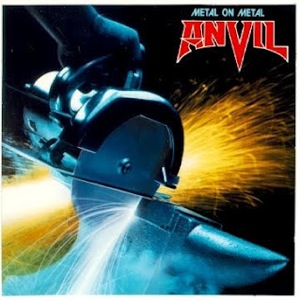By Avinash Mittur
 Thirty years ago on April 15, 1982, Anvil’s classic album, Metal On Metal, was released. This was the record where Anvil perfected their pioneering sound. It took the complex riffs and speed of Judas Priest, the aggression of punk rock, and the simplicity of AC/DC to form one of the earliest versions of thrash metal. Anvil’s first album, Hard ‘N Heavy hinted at this, but Metal On Metal was where the band’s songwriting truly hit its stride.
Thirty years ago on April 15, 1982, Anvil’s classic album, Metal On Metal, was released. This was the record where Anvil perfected their pioneering sound. It took the complex riffs and speed of Judas Priest, the aggression of punk rock, and the simplicity of AC/DC to form one of the earliest versions of thrash metal. Anvil’s first album, Hard ‘N Heavy hinted at this, but Metal On Metal was where the band’s songwriting truly hit its stride.
As so many metal fans now know, this wasn’t the album that broke Anvil big. It just never happened. This album was the one that influenced countless musicians throughout the eighties however. Robb Reiner’s double bass triplets could later be heard by countless thrash metal drummers, and his furious non-stop assault was among the first of its kind to be applied in such an aggressive fashion. Motorhead’s Overkill and Judas Priest’s Exciter may have been the first metal songs to prominently feature double bass within heavy metal, but 666 took was a whole new level of intensity and aggression.
Half of this album continues to be played live by the band; March of the Crabs has opened every Anvil show for who knows how long now, and Metal On Metal is always guaranteed to draw the largest cheers of the night. Mothra continues to be a showcase for Lips’ proficiency with the vibrator, while the fan favorite Jackhammer has been used as the band’s showstopper on many tours. 666 of course, usually tends to get bodies moving as soon as Robb’s flying feet kick in.
Metal On Metal’s production was a marked improvement over Hard ‘N Heavy; Chris Tsangarides had just began his career as a producer, and already he was giving metal bands the sound they deserved. His work with Anvil is still among their most acclaimed to this day, and his career later led to such career highs like his work on Judas Priest’s Painkiller. Lips’ voice wasn’t buried under the mix, and his and Dave Allison’s guitars sounded downright lethal with Chris on the board.
Some of the deep cuts on Metal On Metal still hold up well today; Tag Team rides a mean groove and features a killer solo from Lips, while Heat Sink rips with as much speed and intensity as the more well known Anvil tracks. Stop Me, featuring Dave Allison on vocals, hasn’t aged nearly as well and remains a track that is well worth skipping when listening to the album as a whole.
Metal On Metal is a great album by a band that never really got what they deserved. It may not even be their best (the band’s next album, Forged In Fire, will always be my personal favorite), but it was certainly their most influential record. Drummers and guitarists all over America sought to emulate the sheer insanity that was recorded on Metal On Metal, and thrash metal was only months away from being born. Thirty years later, Metal On Metal remains a fun record to listen to, and an important snapshot of a time when 150 BPM wasn’t a standard, but a revolution.